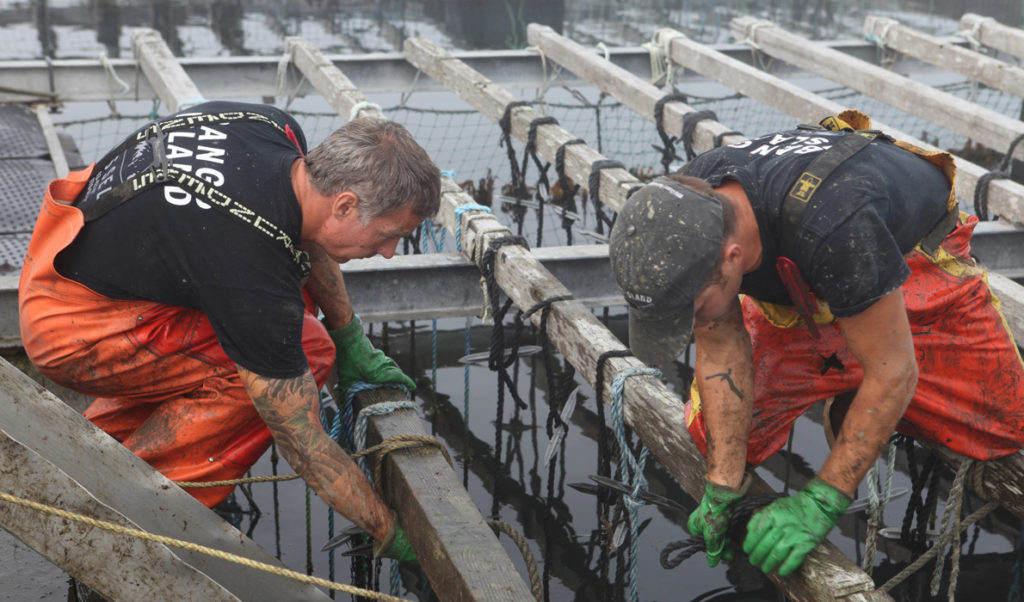The Maine Technology Institute and Alliance for Maine’s Marine Economy have awarded eight grants to projects ranging from value-added seafood processing to seaweed aquaculture to shellfish aquaculture. The grant winners cover the coast from York to Washington counties.
The marine economy grants and cluster initiative programs are financed by the marine economy and jobs bond approved by voters in 2014. The Maine Technology Institute manages the grants for the state.
Proposals were reviewed according to five criteria: economic impact, industry-identified need and/or support, project scope and approach to innovation, project team and resources, and quality of budget and finances.
Summary of awards:
- Bigelow Laboratory for Ocean Sciences, East Boothbay, $93,600—Maine’s algal economy has a long history but has significant room for expansion. Some of the primary limitations to growth and innovation are a lack of new products and a lack of technology. Bigelow will purchase equipment to expand technological capabilities and will facilitate bringing new products to market.
- Blue Hill Bay Mussels, Hancock, $44,328—The company’s project will commercialize the practice of remote settlement, which will benefit Maine’s rope-grown mussel industry by giving growers more control over the settlement of mussel spat. The current practice of relying on a single annual cohort of mussel spat to settle at the optimum time and in adequate numbers limits growth. A collaboration between Blue Hill Bay Mussels and the Downeast Institute, this project commercializes proven hatchery technology.
- Coastal Enterprises Inc., Brunswick, $66,574—CEI will work to increase the sustainable supply, quality, and diversity of domestic seafood by pioneering new technology to aid in the production of high-value, farm-raised sea scallops. Production is expected to grow markets through Maine brand recognition.
- Community Shellfish, Bremen, $100,000—The company’s project entails the rehabilitation and re-purposing of a grandfathered lobster pound on the Medomak River to grow shellfish. The project could have long-lasting impact by creating a new industry for the area’s working waterfront.
- Maine Seafood Ventures, Saco, $400,000—For decades, Maine’s lobster processing industry has struggled to compete with Canada’s subsidized processing infrastructure. Maine’s processing industry is now growing and Maine Seafood Ventures has been at the forefront of this growth. The award will allow use of the latest high-pressure processing technology to expand markets for fresh Maine lobster meat by extending its shelf life.
- Mook Sea Farm, Walpole, $336,000—Mook Sea Farm is building a multipurpose oyster facility that will expand production and advance the development of land-based shellfish farming.
- Pemaquid Mussel Farms, Damariscotta, $250,400—Pemaquid Mussel Farms helped develop mussel raft aquaculture in Maine, and has recently developed a breakthrough in mussel raft technology, the patented submersible mussel raft, which reduces risk, triples seed to harvest yields, and will allow Maine growers to take advantage of a $10 million a year market opportunity for Maine grown rope cultured mussels.
- Springtide Seaweed, Port Clyde, $180,000—The grant will support the creation of a new aquaculture seaweed exchange for new and existing farmers to expand seaweed production, increase jobs, and develop innovative new and value-added products. This project brings together the largest seaweed farmers in the state and a comprehensive collaboration with processing, packaging, distribution, and product development specialists and enterprises. The exchange will particularly support organic, sustainable, and restorative practices.
- Shucks Maine Lobster, Gorham, $400,000—Shucks Maine Lobster has become an internationally award-winning Maine Lobster processor of innovative value-added products utilizing state-of-the-art high-pressure processing technology with 60 employees. Shucks is on the verge of significant growth with plans to expand into a new facility; dramatically increase its product line; add 20 new jobs; and sign new agreements with two major players in the Maine lobster industry.
MTI is a publicly financed, private, nonprofit organization created by the legislature in 1999 to stimulate research and development activity leading to the commercialization of new products, processes and services in the state’s seven targeted technology sectors. MTI programs are either loans, equity investments, or grants designed.
The Alliance for Maine’s Marine Economy is a network of companies, organizations, and individuals dedicated to the growth of a vibrant marine economy for Maine. The mission is to ensure that Maine seafood, fishing, and aquaculture industries, and the natural and innovation ecosystems on which they depend, are healthy and benefit Maine people. More information on the Alliance is at https://umaine.edu/alliance/.
Information on the marine capital grants program, deadlines, and the application processes is at www.mainetechnology.org.





